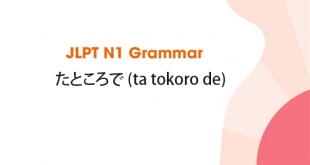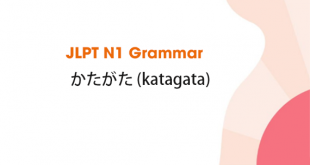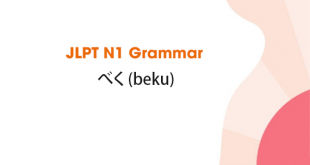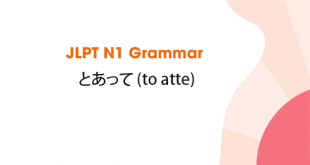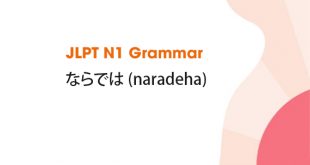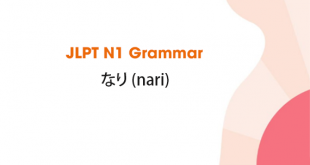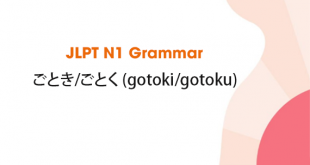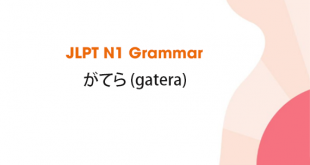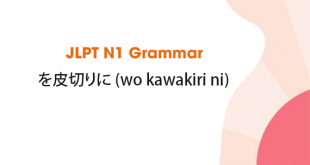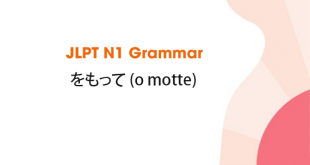Learn JLPT N1 Grammar: たところで (ta tokoro de) Meaning: even if … How to use the: Verb-casual, past + ところで Explain: Used in the case of expressing the subjective judgment of the speaker, which negates the assumption that it is useless or contrary to prediction. Example sentences: 1, 今頃になって急いだところで、無駄だ。 imagoro …
Read More »Grammar N1
Learn JLPT N1 Grammar: かたがた (katagata)
Learn JLPT N1 Grammar: かたがた (katagata) Meaning: while; at the same time; for the purpose of How to use the: Noun + かたがた Explain: In the case of doing something, by the way, always do, along with another action Example sentences: 1, 友達が風邪をひいたというので、お見舞いかたがた家を訪ねることにした tomodachi ga kaze o hīta to iu …
Read More »Learn JLPT N1 Grammar: べく (beku)
Learn JLPT N1 Grammar: べく (beku) Meaning: in order to; for the purpose of How to use the: Verb-dictionary form + べく する -> するべく/すべく Explain: Used in the case of talking about what the purpose is, what it thinks it will do Example sentences: 1, 大学に進むべく上京した。 daigaku ni susumubeku …
Read More »Learn JLPT N1 Grammar: とあって (to atte)
Learn JLPT N1 Grammar: とあって (to atte) Meaning: because of How to use the: Verb-casual + とあって Noun + とあって いadj + とあって なadj + とあって Explain: Describe the situation because there are special circumstances Example sentences: 1, 一年に一回のお祭りとあって、村の人は皆神社へ集まっていた。 ichinen ni ikkai no omatsuri to atte, mura no hitohamina jinja …
Read More »Learn JLPT N1 Grammar: ならでは (naradeha)
Learn JLPT N1 Grammar: ならでは (naradeha) Meaning: uniquely; special to How to use: Noun + ならでは Explain: With the sentence A な ら で は, there is only A, besides A, there is no. Example sentences: 1, 親友ならではの細かい心遣いがうれしかった。 shin’yū-naradeha no komakai kokorodzukai ga ureshikatta. I am very happy to receive …
Read More »Learn JLPT N1 Grammar: なり (nari)
Learn JLPT N1 Grammar: なり (nari) Meaning: as soon as How to use the: Verb-dictionary form + なり Explain: Used in the case of performing an immediate follow-up action. Often the latter is an unexpected, unpredictable action. Example sentences: 1, 家に帰るなり自分の部屋に閉じこもって出てこない。 ienikaeru nari jibun no heya ni tojikomotte detekonai. As …
Read More »Learn JLPT N1 Grammar: ごとき/ごとく (gotoki/gotoku)
Learn JLPT N1 Grammar: ごとき/ごとく (gotoki/gotoku) Meaning: like; as if; the same as How to use the: Verb-casual + ごとく Noun + のごとく/ごとき Explain: Used to give an example in a formal document Used when expressing negative implications, belittling, anxiety Example sentences: 1, 私ごとき未熟者にこんな大きい仕事はちょっと。。。 watashigotoki mijukumono ni kon’na ōkī shigoto …
Read More »Learn JLPT N1 Grammar: がてら (gatera)
Learn JLPT N1 Grammar: がてら (gatera) Meaning: on the same occasion; at the same time; coincidentally How to use the: Verb ます (sterm form) + がてら Noun + がてら Explain: Used to show the case in the process of completing an action / event, at the same time, by the way …
Read More »Learn JLPT N1 Grammar: を皮切りに (wo kawakiri ni)
Learn JLPT N1 Grammar: を皮切りに (wo kawakiri ni) Meaning: starting with; beginning of How to use the: Noun + を皮切りに(して)/を皮切りとして Explain: Used in the case when it comes to performing an action then the same situation will last. Example sentences: 1, 彼の店は京都で成功したのを皮切りに、各地に次々と出店していずれも成功を収めた。 kare no mise wa kyouto de seikou shita …
Read More »Learn JLPT N1 Grammar: をもって (o motte)
Learn JLPT N1 Grammar: をもって (o motte) Meaning: by means of; at the time How to use the: Noun + をもって Explain: Used to state the reason Used to indicate when to start (or end) something Use to indicate status Example sentences: 1, このレポートをもって、結果報告とする。 kono repōto o motte, kekka hōkoku …
Read More » Nihongo Nihongo
Nihongo Nihongo
